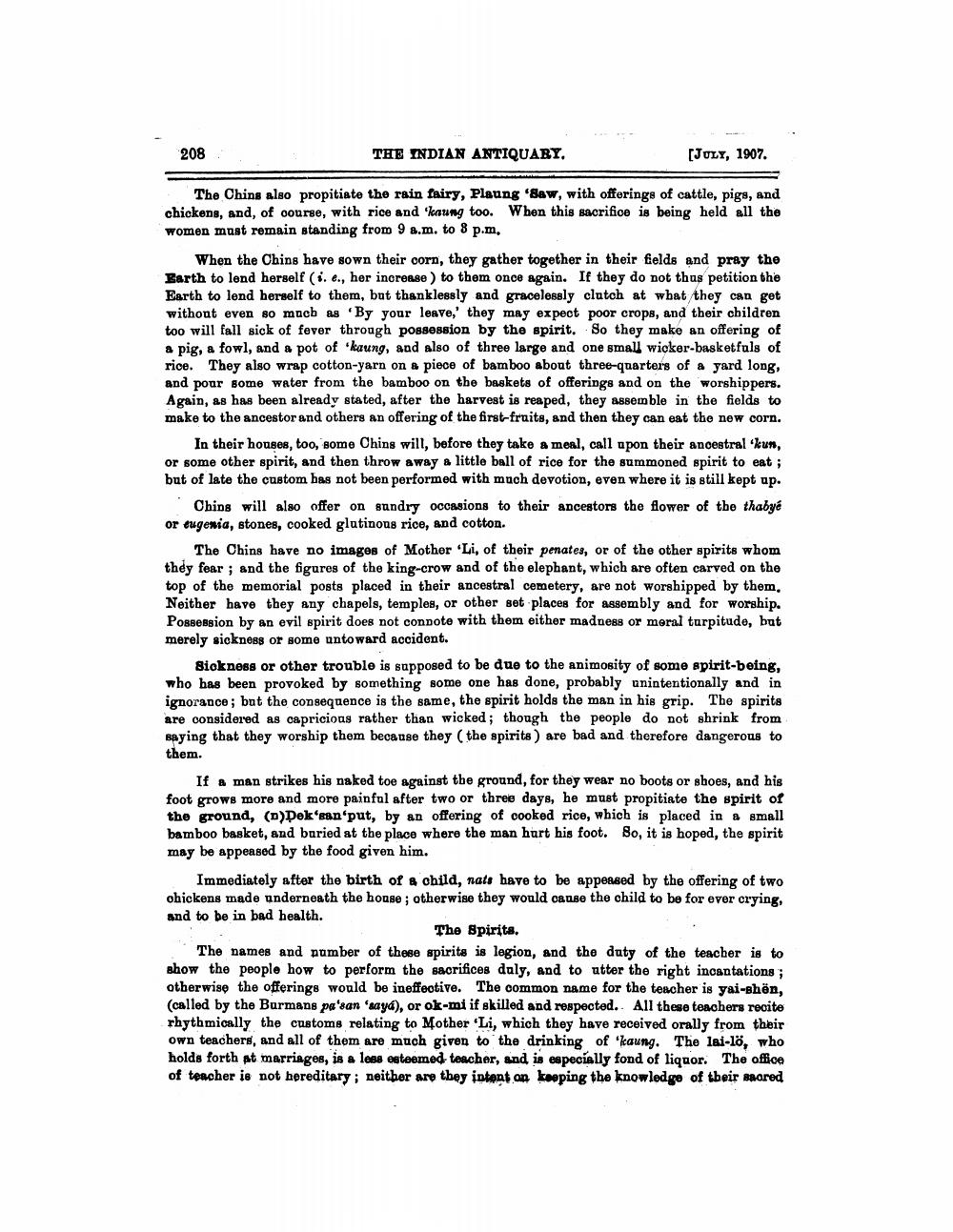________________
208
THE INDIAN ANTIQUARY.
[JULY, 1907.
The Chins also propitiate the rain fairy, Plaung 'Baw, with offerings of cattle, pigs, and chickens, and, of course, with rice and 'kaung too. When this sacrifice is being held all the women must remain standing from 9 a.m. to 8 p.m.
When the Chins have sown their corn, they gather together in their fields and pray the Earth to lend herself (i. e., her increase) to them once again. If they do not thus petition the Earth to lend herself to them, but thanklessly and gracelessly clutch at what they can get without even so much as By your leave,' they may expect poor crops, and their children too will fall sick of fever through possession by the spirit. So they make an offering of a pig, a fowl, and a pot of kaung, and also of three large and one small wicker-basketfuls of rice. They also wrap cotton-yarn on a piece of bamboo about three-quarters of a yard long, and pour some water from the bamboo on the baskets of offerings and on the worshippers. Again, as has been already stated, after the harvest is reaped, they assemble in the fields to make to the ancestor and others an offering of the first-fruits, and then they can eat the new corn.
In their houses, too, some Chins will, before they take a meal, call upon their ancestral 'kun, or some other spirit, and then throw away a little ball of rice for the summoned spirit to eat; but of late the custom has not been performed with much devotion, even where it is still kept up.
Chins will also offer on sundry occasions to their ancestors the flower of the thabyé or eugenia, stones, cooked glutinous rice, and cotton.
The Chins have no images of Mother 'Li, of their penates, or of the other spirits whom they fear; and the figures of the king-crow and of the elephant, which are often carved on the top of the memorial posts placed in their ancestral cemetery, are not worshipped by them. Neither have they any chapels, temples, or other set places for assembly and for worship. Possession by an evil spirit does not connote with them either madness or meral turpitude, but merely sickness or some untoward accident.
Sickness or other trouble is supposed to be due to the animosity of some spirit-being, who has been provoked by something some one has done, probably unintentionally and in ignorance; but the consequence is the same, the spirit holds the man in his grip. The spirits are considered as capricious rather than wicked; though the people do not shrink from saying that they worship them because they (the spirits) are bad and therefore dangerous to them.
If a man strikes his naked toe against the ground, for they wear no boots or shoes, and his foot grows more and more painful after two or three days, he must propitiate the spirit of the ground, (n)Dek'san'put, by an offering of cooked rice, which is placed in a small bamboo basket, and buried at the place where the man hurt his foot. So, it is hoped, the spirit may be appeased by the food given him.
Immediately after the birth of a child, nats have to be appeased by the offering of two chickens made underneath the house; otherwise they would cause the child to be for ever crying, and to be in bad health.
The Spirits.
The names and number of these spirits is legion, and the duty of the teacher is to show the people how to perform the sacrifices duly, and to utter the right incantations; otherwise the offerings would be ineffective. The common name for the teacher is yai-shën, (called by the Burmans pa'san 'saya), or ok-mi if skilled and respected. All these teachers recite rhythmically the customs relating to Mother 'Li, which they have received orally from their own teachers, and all of them are much given to the drinking of 'kaung. The lai-lö, who holds forth at marriages, is a less esteemed teacher, and is especially fond of liquor. The office of teacher is not hereditary; neither are they intent on keeping the knowledge of their sacred




